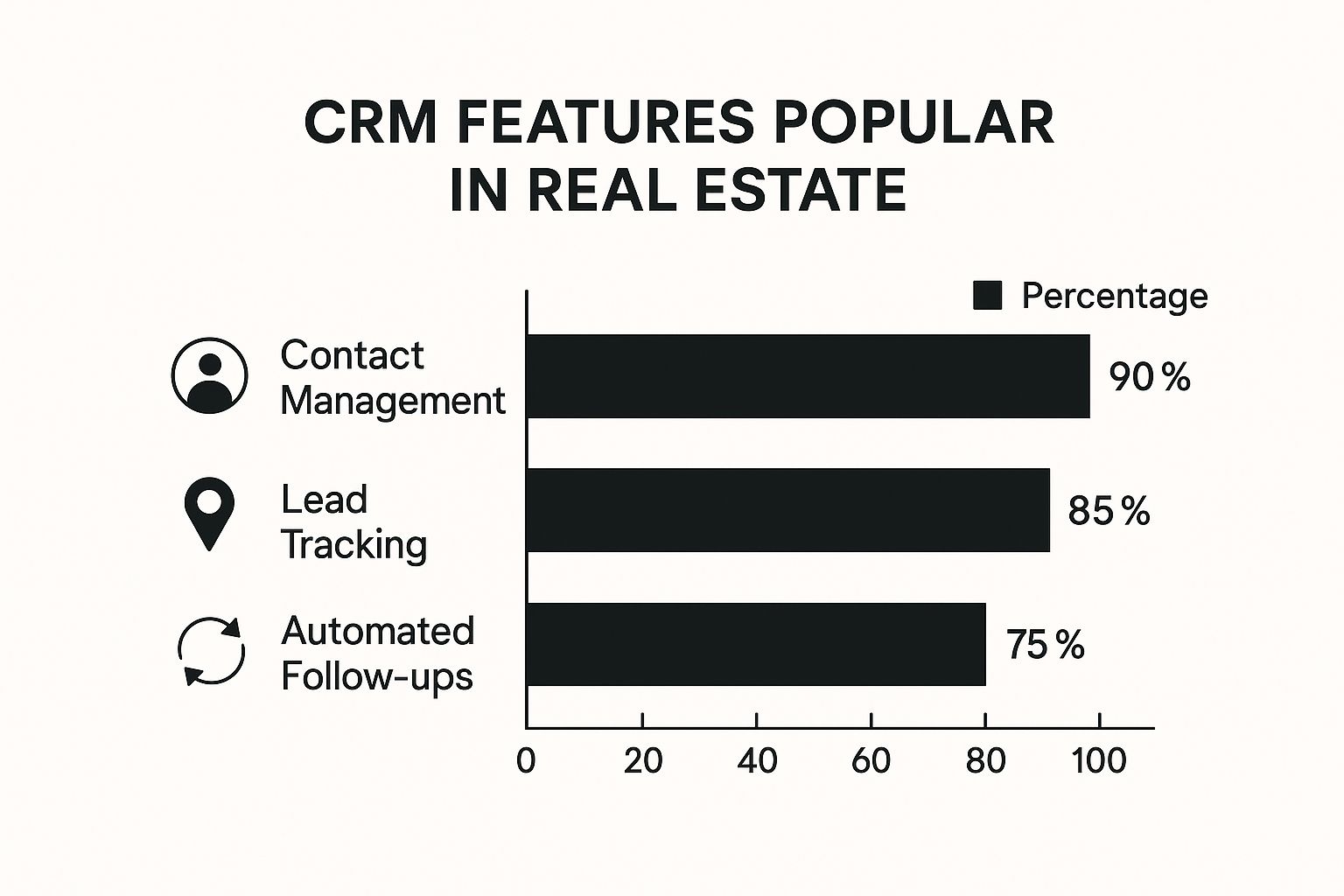If you're an agent juggling dozens of clients, you know the chaos of spreadsheets, sticky notes, and a memory stretched to its limits. A real estate CRM acts as your digital command centre, bringing order to the madness. It organizes client relationships, tracks every lead follow-up, and keeps property details in one clean place, making sure no opportunity slips away.
This simple shift allows you to stop managing data and start building relationships that close deals.
Why a CRM Is Non-Negotiable for Modern Real Estate Agents
Picture yourself as an air traffic controller. Every plane is a client. Some are just taking off (new leads), others are cruising at altitude (active buyers), and a few are coming in for a landing (closing time). Trying to manage all of that with a notepad and pen? It’s a recipe for disaster.
That’s what it feels like to be a real estate agent without a solid system.
A Customer Relationship Management (CRM) platform is your control tower. It gives you a single, clear view of every client interaction, property showing, and looming deadline. It replaces chaos with clarity.
Systematize Your Success
A good CRM is more than just another app on your phone; it’s a business partner that puts a system behind your success. It ensures critical follow-ups happen on time and every lead gets the attention it deserves, from the first "hello" to the final signature on the dotted line.
For smaller agencies or solo agents, this structured approach is a game-changer. You can learn more in this comprehensive guide to CRM for small business growth to see how these fundamentals work across different industries.
This level of organization directly impacts your bottom line. Just look at the top performers.
At the end of the day, the goal is simple: spend less time drowning in admin and more time doing what you do best. Building lasting client relationships. To dig deeper into this, understanding the pivotal role of CRM systems in real estate agency success is a great next step.
A CRM helps you deliver incredible service consistently, turning one-time transactions into a career's worth of referrals.
How a Real Estate CRM Actually Works

Let's get past the acronym and talk about what a CRM actually does for your day-to-day business. How does this software help you sell more homes? The easiest way to picture a CRM in the real estate industry is to think of it as a perfect, digital memory for your entire operation.
Imagine having a personal assistant who remembers every single client conversation, every important date, and every unique property preference you’ve ever discussed. This assistant never forgets a birthday, a follow-up call, or that a client only wants homes with a south-facing garden. That’s exactly what a CRM does for you.
It takes the flood of information you juggle every day and organizes it into a clean, actionable system. This system is built on three core pillars that work together to turn scattered data into closed deals.
Centralised Contact Management
At its core, a CRM is about bringing order to the chaos. Say goodbye to messy spreadsheets, random sticky notes, and a bursting inbox. Every single person—from new leads and current clients to past customers and industry partners—gets their own detailed profile. This creates one single, reliable place for all your relationship information.
Before you even pick up the phone, you can pull up a client's entire history in seconds. You’ll see every email you've exchanged, every property they’ve shown interest in, and any personal notes you jotted down from your last chat.
- Here’s how it plays out: An old client, the Miller family, calls you out of the blue. Instead of fumbling to recall the details, you open their CRM profile. Instantly, you see that you sold them their home three years ago, their daughter just started university (a note you made), and they came to your client appreciation event last fall. You can start the call with a personal touch that makes all the difference.
This kind of instant access turns generic check-ins into meaningful, informed conversations. It’s the difference between asking, "How are you?" and "How is Sarah enjoying her first semester at McGill?"
Visual Deal and Pipeline Tracking
A real estate transaction has dozens of moving parts. A CRM cuts through that complexity by laying out your entire sales pipeline visually. On a single screen, you can see every deal and exactly where it stands—from "New Inquiry" and "Showing Scheduled" all the way to "Under Contract" and "Closed."
This visual dashboard is more than just a neat organizational tool; it’s your financial crystal ball. You know exactly where your potential income is at all times.
Ultimately, a real estate CRM is built to guide the entire lead lifecycle. You can dive deeper into the process of managing real estate leads effectively to see how this works from start to finish. This level of visibility ensures opportunities don’t slip through the cracks, even when you're swamped.
Automated Communication and Follow-Up
One of the most valuable things a CRM does is take repetitive communication off your plate. By automating routine tasks, it frees you up to focus on what you do best: negotiating deals and meeting with clients. You can set up simple workflows that trigger specific actions based on client behaviour or key dates.
These automated touchpoints make sure no client ever feels forgotten, nurturing your relationships even when you're busy with other things.
Examples of Smart Automation:
- Welcome Series for New Leads: A new lead signs up on your website. The CRM can instantly send a welcome email and then create a task for you to follow up personally in three days.
- Post-Closing Nurturing: A year after a sale closes, the CRM can automatically send a "Happy Home Anniversary" email to your past clients.
- Birthday Greetings: Without you lifting a finger, the system can send a personalized birthday message to every client in your database.
This kind of strategic automation builds long-term loyalty and drives future referrals, turning your CRM from a simple database into a powerful engine for business growth.
Must-Have CRM Features for Real Estate Agents
Not all CRM platforms are built the same. What works for a retail business will likely fall flat in the fast-paced world of property transactions. When you're looking at CRMs for real estate, you need to zero in on specific features that actually support an agent's daily grind. These are the tools that turn your hard work into closed deals.
Think of it like a mechanic's toolbox. A generic set of wrenches is fine, but a specialized kit for a specific car model makes the job faster and far more efficient. The right CRM features are your specialized tools, perfectly suited for the unique demands of real estate. Let's break down the non-negotiables.
Contact Management and Lead Nurturing Automation
This is the absolute foundation. A real estate CRM needs to be more than just a digital address book; it should give you rich, detailed client profiles. It needs to track every single interaction, from the first time someone visits your website to your follow-up calls years after closing. This gives you a complete picture of every relationship.
But the real magic happens with automated lead nurturing. While you're out at a showing or sitting at a closing table, your CRM should be working for you in the background. It can send a series of pre-written, personalized emails to new leads, keeping them warm with relevant market updates or helpful home-buying guides. This alone ensures no potential client goes cold just because you got busy.
Visual Pipeline Management
A real estate deal has a ton of stages, and trying to track them all in your head or on a spreadsheet is just asking for trouble. A visual pipeline is a game-changer. It lays out every single one of your deals on a clear, Kanban-style board, letting you see exactly where each client is in their journey—from "Initial Contact" to "Under Contract" and finally, "Closed."
This feature is your business's command centre. It helps you:
- Accurately forecast your commissions by seeing what deals are likely to close soon.
- Spot bottlenecks where clients seem to be stuck, so you know where to focus your energy.
- Prioritize your day by instantly seeing which tasks are most critical to moving a deal forward.
With just a glance, you can grasp the health of your entire business. This lets you make proactive decisions instead of constantly reacting to problems. To see how different platforms handle this, you can explore some of the best lead management software for sales teams, which often showcase these visual tools.
The image below highlights just how critical these core features are in the industry.

This data clearly shows that agents rely heavily on foundational tools like contact management and lead tracking to keep their businesses organized and moving forward.
Seamless MLS Integration
Manually keying in property details into your CRM is a monumental waste of time. Any real estate CRM worth its salt must have direct Multiple Listing Service (MLS) integration. This allows the system to automatically pull in property listings, photos, status updates, and pricing information.
This doesn't just save you time; it makes you a much more responsive and informed agent. When a client calls asking about a new listing, you have all the data right at your fingertips. No more jumping between multiple systems—everything stays smooth and centralized.
Task Automation and Reminders
The administrative load in real estate is no joke. A top-tier CRM helps lift that weight through task automation. You can set up simple "if this, then that" rules that build out your daily to-do list for you. For example, when you move a client to the "Showing Scheduled" stage, the CRM can automatically create a task to follow up the next day for feedback.
This simple function ensures nothing falls through the cracks. It reminds you of key dates, follow-up calls, and contract deadlines, basically acting as your personal assistant. By taking all that repetitive administrative work off your plate, it frees you up to focus on high-impact activities like meeting clients and negotiating offers.
Let's look at how these core features directly translate into a more productive day for an agent.
Impact of Core CRM Features on a Real Estate Agent's Day
table block not supported
As you can see, each feature isn't just a bell or a whistle; it's a tool designed to solve a specific problem that agents face every day.
Robust Reporting and Analytics
Finally, you can't improve what you don't measure. A quality CRM comes with reporting dashboards that turn your sales data into insights you can actually use. It can show you which lead sources—whether it's your website, referrals, or social media—are bringing in the most valuable clients.
These analytics help you make smarter business decisions. You can see your average deal cycle, identify your top-performing marketing campaigns, and track your progress toward your income goals. This data-driven approach moves you from guessing what works to knowing what works, so you can invest your time and money where they'll have the biggest impact.
How AI and Automation Are Upgrading Your CRM

The future of real estate isn't some far-off concept; it’s happening right now inside your CRM. Artificial Intelligence (AI) and automation are no longer just buzzwords for tech giants. They’re practical tools that can turn your CRM in the real estate industry from a simple database into a proactive partner that works for you.
Think of it this way: a basic CRM is like a detailed paper map. It shows you where all your clients live, but you still have to figure out the best route yourself. An AI-powered CRM, however, is your personal GPS with live traffic updates. It doesn’t just show you the map; it highlights the fastest route to a closing, warns you about potential dead ends, and even suggests a better way to get there.
These smart features are now well within reach for solo agents and smaller brokerages, giving you a serious edge by boosting your efficiency and revealing opportunities you might have otherwise missed.
AI-Powered Lead Scoring and Prioritization
We all know that not all leads are created equal. For years, agents have had to rely on gut feelings or basic details to figure out who to call first. AI flips that script entirely with predictive lead scoring. It works by watching a lead's digital body language—which listings they click on, how many times they visit your site, or which emails they actually open.
Based on all that activity, the AI gives each prospect a score, showing you exactly how likely they are to convert. Suddenly, your CRM is telling you who's hot and ready for a call, and who needs a bit more time and nurturing.
- Here’s how it works in real life: Imagine you get 20 new website leads overnight. Instead of starting at the top of the list, your AI-powered CRM flags three specific leads with sky-high scores. It points out that one of them has looked at the same three-bedroom home five times in the last 24 hours. You call that person first, armed with real insight, and you book a showing.
This kind of focus stops you from spinning your wheels on lukewarm prospects and lets you pour your energy where it counts the most.
Intelligent Communication Automation
Modern automation goes way beyond sending out a generic "Happy Birthday" email. With AI, you can have highly personalized conversations at scale, making every client feel like they're your only one. The system looks at a client's profile and past behaviour to craft messages that are genuinely helpful.
For example, if a past client suddenly starts browsing listings for larger homes on your website, the AI can trigger an automated but personal email. It could say something like, "Hey, noticed you were looking at bigger homes! Thinking of making a move? Here’s a quick update on what your current place might be worth."
This tech is already making waves. In dynamic markets like California, AI-enhanced CRMs are becoming a key tool, especially in the commercial sector which accounts for about 63% of real estate software use. For some platforms, adding AI-driven lead prioritization has improved call efficiency by up to 73%, letting agents manage personalized outreach on a massive scale. To get a better sense of how technology is reshaping different markets, you can read the full research about the global real estate CRM software market.
Advanced Analytics and Sales Forecasting
Finally, AI gives you a crystal ball for your business. By crunching your past sales data, current market trends, and what’s in your pipeline, AI-driven analytics can deliver surprisingly accurate sales forecasts. It helps you see your average deal cycle, pinpoint which marketing channels are actually making you money, and even predict slow months before they happen.
This kind of data-backed insight lets you make strategic moves with confidence. You’re no longer just reacting to the market—you’re anticipating it, tweaking your strategy to stay ahead and hit your goals, quarter after quarter.
A Practical Plan for Implementing Your First CRM
Bringing a new piece of technology into your business can feel like a massive project, but getting a CRM for your real estate business up and running doesn't have to be a headache. The secret is to break the process down into clear, manageable phases. If you follow a structured plan, you can make a smooth transition and start seeing the payoff without completely derailing your day-to-day operations.
Think of it less as one giant leap and more as a series of small, deliberate steps. This phased approach helps you and your team get comfortable with the new system, turning what could be chaos into a controlled and successful launch. Let's walk through the four key phases.
Phase 1: Choose the Right Platform
Before you do anything else, you need to pick a CRM that actually fits your life as a real estate professional. Not all platforms are built the same, and the fancy system that works for a big retail chain probably lacks the specific tools you need to manage listings and close deals. Your goal is to find a tool that feels less like a chore and more like a natural part of your workflow.
Start by getting honest about your biggest pain points. Are you dropping the ball on lead follow-up? Is your contact data a complete mess spread across three different apps? Do you feel like you have no real visibility into your sales pipeline? Answering these questions will help you pinpoint the features that will actually make a difference for you.
When you start looking at different CRMs, go in with a checklist of questions geared specifically toward real estate.
- MLS Integration: Can the CRM connect directly to your local MLS to automatically pull in property details? This is a huge time-saver.
- Lead Capture: How easily can it grab leads from your website, social media, and sites like Zillow or Realtor.ca?
- Automation Rules: Does it let you set up automated follow-up plans for different client types, like first-time homebuyers versus past clients you want to stay in touch with?
- Mobile Access: Is the mobile app actually useful? You need to be able to manage contacts and update deals from your car, not just from your desk.
- Scalability: Will this platform grow with your business, or are you going to be looking for a new one in two years?
Making the right choice here is probably the single most important step for long-term success. Take your time.
Phase 2: Clean and Migrate Your Data
Once you’ve landed on the perfect CRM, the next critical job is getting your data ready. This is a step where a lot of agents get tripped up. A brand-new CRM is useless if you feed it messy, outdated information—it's the classic "garbage in, garbage out" problem. Now is your chance to do a bit of spring cleaning on your contact lists.
Start by pulling all of your contacts together from every corner of your digital life: your phone, your email, old spreadsheets, and yes, even that stack of business cards on your desk. Once you have a master list, it's time to get ruthless. Merge duplicates, fix typos in names and email addresses, and delete contacts that are no longer relevant.
